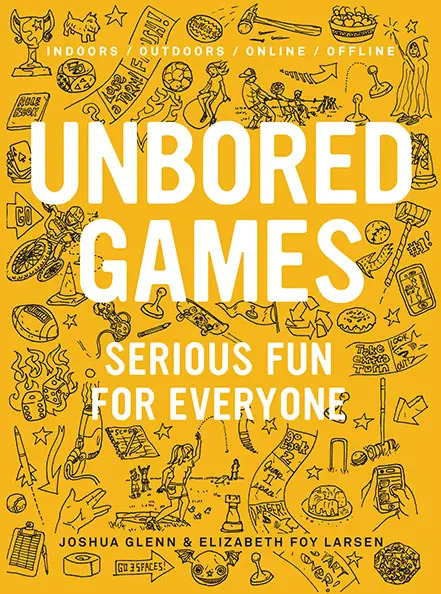Want to encourage people to be kinder to each other? These three games from Unbored Games by Joshua Glenn and Elizabeth Foy Larson encourage kindness and giving back year-round through Boom Boom! cards and random acts of kindness.
Players: The more the merrier
Want to encourage people to be kinder to each other? Want to discourage bullying? Try playing a couple of the following games.
Guerilla Kindness
Offer to help someone struggling with their bags at the grocery store. Pick up litter on the street. Thank your grownup for driving you everywhere, or thank a teacher for inspiring you. Performing random acts of kindness is contagious—especially if you turn it into a game. Invite friends to keep track of their kind acts during an assigned 24-hour period. By the end, whoever has accomplished the most is the Guerrilla Kindness champ. Until next time, that is.
PS: You can also gamify your acts of kindness by purchasing Boom Boom! Cards, a kit containing 26 cards—each of which suggests a particular act of kindness. Your deck has a unique code, which you register at the website boomboomcards.com. After performing each act of kindness, log in and tell your fellow “agents of altruism” about it; then pass along that particular card to a friend. Via the website, you can track your friends’ acts of kindness, too.
Cruel 2 B Kind
You’ll need:
|
Alternate reality game designers Jane McGonigal and Ian Bogost dreamed up this twist on assassination-type games. Like those games, it requires a group of at least five people (the more the better), and it takes place in public spaces—like parks or entire neighborhoods. However, the goal of Cruel 2 B Kind is to “kill” one another with kindness.
As in most ARGs, you’ll need a game moderator (or “puppet master”), who sets the game’s date and time and geographical boundaries, helps players remember the rules, and choose each team’s “weapons.” The moderator—usually a grownup or teenager, because they’ll need to communicate with players via telephone, email, and text messages—might decide, for example, that you can “assassinate” a target by blowing a kiss, pretending to mistake them for a celebrity, or paying them an outrageously nice compliment. Each time you successfully “kill” someone with kindness, you let the moderator know and they assign points.
Here’s where things get really interesting. As in many other ARGs played in a public space, among a group of people who don’t know one another well, you might not know who your opponents are. So you might end up complimenting or blowing a kiss to a random passerby. Which is the whole point of the game: spreading kindness, one person at a time.
Face Value
During our day-to-day lives, do we treat one another as nicely as we possibly could? Here’s an easy card game—you can play it at school, or at a party—that get players thinking about that question.
You’ll need:
|
Try this:
|
 |
Copyright ©2014 Joshua Glenn and Elizabeth Foy Larsen UNBORED Games: The Essential Guide reprinted by permission of Bloomsbury USA |






















